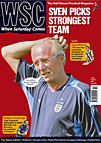 Arsenal fans worried that they hadn’t heard of Champions League rivals Thun shouldn’t be embarrassed. Paul Joyce explains the rise of the tiny Swiss side, with players whose annual salaries are less than many Premiership stars get in a week
Arsenal fans worried that they hadn’t heard of Champions League rivals Thun shouldn’t be embarrassed. Paul Joyce explains the rise of the tiny Swiss side, with players whose annual salaries are less than many Premiership stars get in a week
Having hosted West Germany’s World Cup final victory over Hungary in 1954, the recently rebuilt Stade de Suisse Wankdorf witnessed its second “Miracle of Bern” on August 23. Nine years after gaining promotion from the semi-professional third division and a mere three years after arriving in the top flight, FC Thun 1898 became only the third Swiss side to reach the Champions League, by completing a 4-0 aggregate victory over Swedish side Malmö.
After the self-induced demise of many larger Swiss teams – Servette Geneva went bankrupt last season, FC Lugano and FC Lausanne-Sport had previously been demoted for financial misdemeanours – Thun’s success is just reward for a well run club for whom Champions League qualification guarantees at least one and a half times their entire annual budget of 5.2 million Swiss francs (£2.3m).
Business in the provincial former garrison town is still recovering from military cutbacks and the collapse of the Spar+Leihkasse Thun bank and the Selve metal works in the early 1990s. FC Thun’s major sponsor, the Frutiger construction company, contributes only SFR 300,000 per year and many staff are volunteers.
Players’ wages are thus modest – defender David Pallas is said to be on a basic salary of SFR 90,000 a year. So Thun look to attract players who view the club as a shop window for their talents: Alex Frei of Rennes and Marco Streller of VfB Stuttgart both learned their trade here. Even the prospect of Champions League qualifiers could not prevent six key performers from deserting Thun during the close season, reducing their squad at one point to ten. “We basically have no money for new players,” said president Kurt Weder.
Charismatic manager Hanspeter Latour had already jumped ship for Grasshoppers in December 2004, citing the Zurich side’s greater potential for reaching international competition. His replacement from the lower divisions, Urs Schönenberger, promptly clinched runners-up spot in the Swiss Super League – ten points ahead of Latour’s Grasshoppers.
The Champions League qualifying rounds suggest that Arsenal, Ajax and Sparta Prague should underestimate their Group B opponents at their peril. After being held to a 2-2 draw by Thun in Ukraine, Dynamo Kiev striker Maxim Schazkich boasted: “Something unbelievable needs to happen for us not to go through.” Yet unbelievably, despite Kiev’s budget being 18 times higher than that of Thun, the 1999 Champions League semi-finalists lost the away leg 1‑0 to a late Tiago Bernardi goal and manager Leonid Buryak lost his job.
Malmö, Thun’s next opponents, had two former Champions League winners in their ranks: Jari Litmanen, who nearly joined the Swiss club in the summer, and Patrik Andersson, who ruptured a cruciate ligament in the 1-0 home defeat by Thun, forcing him to retire from football.
Swedish accusations that Thun’s tactics were “boring” overlooks the flexibility of Schönenberger’s 4-5-1 formation and the compactness of a midfield unit steered by Silvan Aegerter and Adriano, one of four Brazilians in the squad. Lone striker Mauro Lustrinelli, whose 30-yard lob sealed a decidedly unboring 3-0 second-leg victory, received an overdue first cap for Switzerland in August at the age of 29. “Some use the lift, others take the stairs,” mused Lustrinelli philosophically. “The only thing that matters is reaching the top.”
Lustrinelli’s level-headedness is mirrored by FC Thun’s reaction to joining the European elite. Mindful of the financial miscalculations of previous unexpected qualifiers such as Norway’s Molde FK and Sweden’s Helsingborgs, president Weder will only sanction a handful of short-term loan signings to bolster the threadbare squad. And Thun’s players spent the morning of the Champions League draw in Allmendingen helping to fight the flood that wiped out the planned post-match festivities in Thun’s town hall square and submerged their dilapidated Lachen stadium (which was already unfit for European competition) beneath a metre of water.
FC Thun’s chances of winning a plebiscite in February 2006 to receive SFR 50m of municipal funding to build a new 10,000-capacity arena have been boosted by their supporters’ rekindled ardour for their local heroes. In May 2005, a mere 400 shares had been sold in a club previously overshadowed by their neighbours Young Boys Bern and Thun’s average league attendance is a paltry 6,000. Yet 31,243 fans travelled to Bern for the Malmö game, with hundreds of ticket-holders left stranded by the floods.
From WSC 224 October 2005. What was happening this month